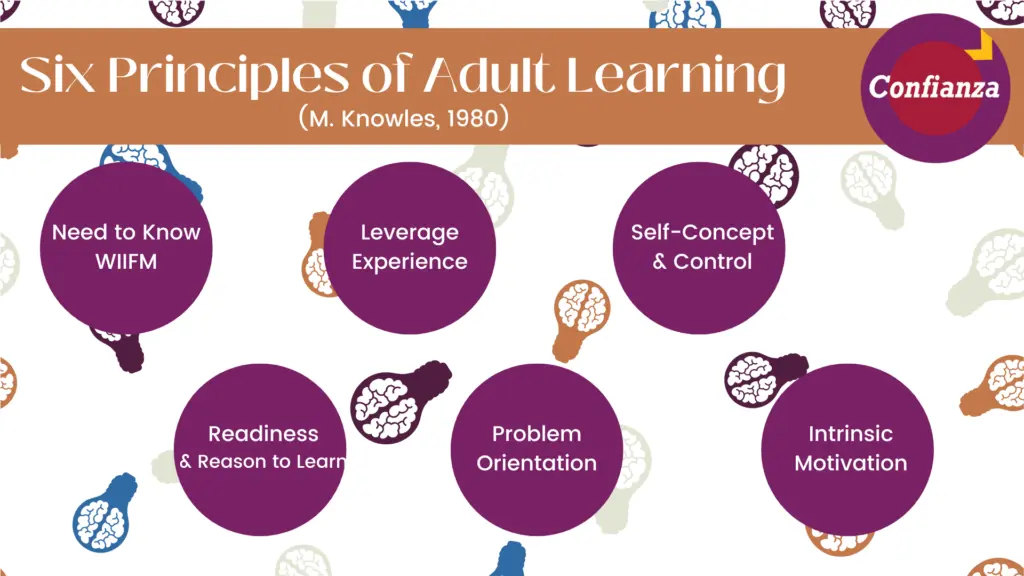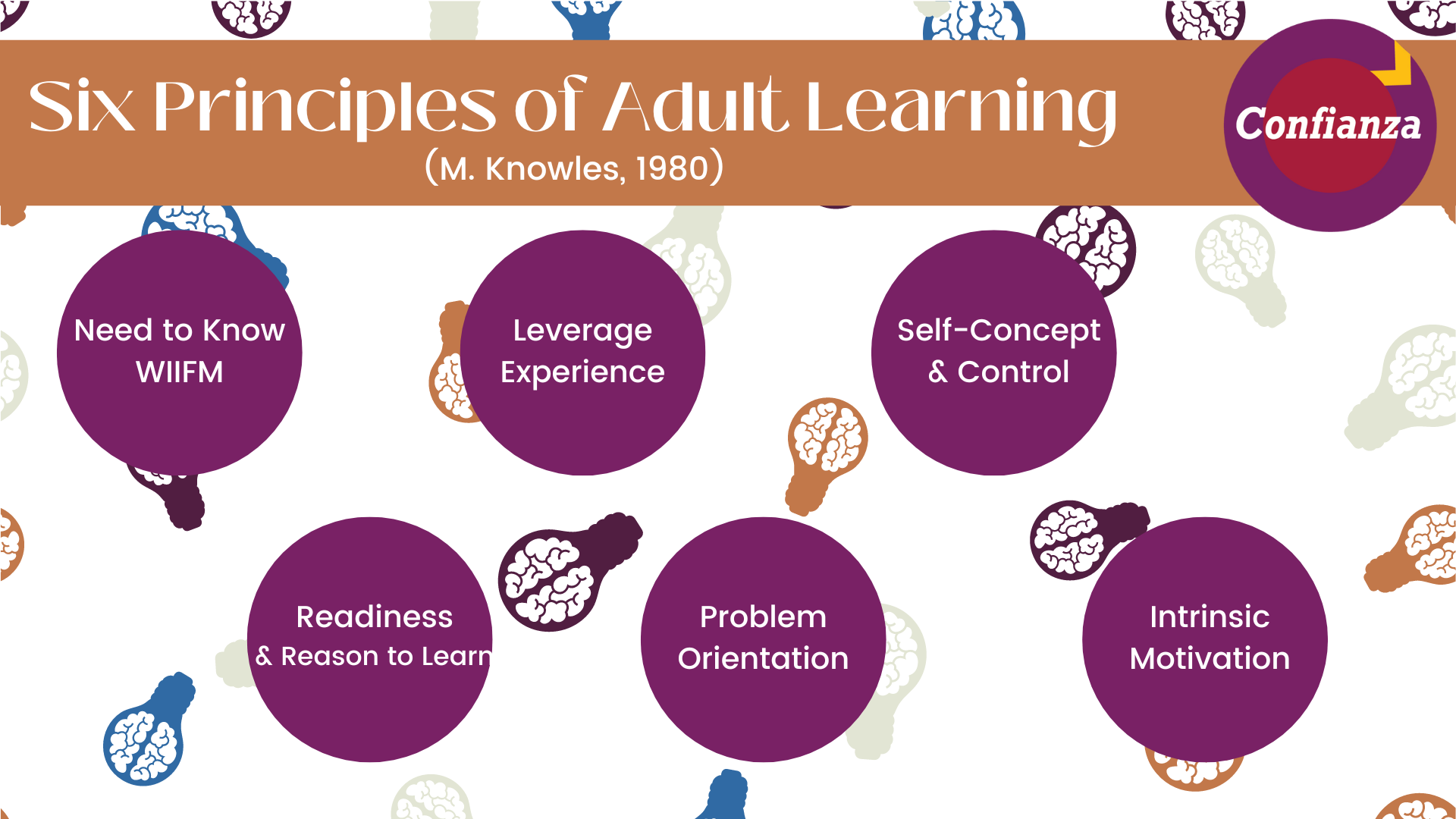
Unlocking Potential: Understanding the Principles of Adult Learning
Adult learning, or andragogy, is a distinct field of study that recognizes the unique characteristics and needs of adult learners. Unlike pedagogy, which focuses on teaching children, andragogy emphasizes self-direction, experience, and relevance in the learning process. Understanding the **principles of adult learning** is crucial for educators, trainers, and anyone involved in facilitating learning experiences for adults. These principles, when effectively applied, can significantly enhance engagement, retention, and the overall effectiveness of educational programs.
The Core Principles of Adult Learning
Malcolm Knowles, a pioneer in adult learning theory, identified several core **principles of adult learning** that form the foundation of andragogical practices. These principles are not rigid rules but rather guidelines that can be adapted to suit the specific context and needs of the learners. Let’s explore each principle in detail:
Self-Concept
Adults have a self-concept of being responsible for their own decisions and lives. They prefer to be treated as capable and independent individuals. In a learning environment, this translates to a need for autonomy and control over their learning process. Learners should be given choices regarding learning objectives, content, methods, and assessment strategies. Respecting their self-concept fosters a sense of ownership and encourages active participation.
Experience
Adult learners bring a wealth of experience to the learning environment. This experience, whether gained through work, family, or personal pursuits, serves as a valuable resource for learning. Effective instruction leverages this prior knowledge by connecting new information to existing frameworks. Activities such as group discussions, case studies, and role-playing allow learners to share their experiences and learn from one another. Ignoring or dismissing their experience can be detrimental, as it can lead to resistance and disengagement.
Readiness to Learn
Adults become ready to learn when they experience a need to know or do something in order to cope with a real-life situation. Their learning is often driven by a desire to solve a problem, achieve a goal, or improve their skills. Therefore, learning experiences should be relevant and applicable to their current or future needs. When learners perceive the value and practicality of the material, they are more likely to be motivated and engaged. Curriculum design should focus on addressing real-world challenges and providing practical solutions. This is a key **principle of adult learning** to consider.
Orientation to Learning
Adult learners are typically problem-centered rather than subject-centered. They prefer to learn in a context that is relevant to their lives and work. Instead of passively absorbing information, they actively seek solutions to specific problems or challenges. Instruction should be organized around real-world scenarios and case studies that require learners to apply their knowledge and skills. This problem-centered approach enhances engagement and makes the learning process more meaningful. Consider how this orientation shifts the focus from rote memorization to practical application, a cornerstone of **adult learning principles**.
Motivation to Learn
Adults are primarily motivated to learn by internal factors such as a desire for self-improvement, job satisfaction, or personal growth. External motivators, such as promotions or salary increases, can also play a role, but intrinsic motivation is generally more powerful and sustainable. Creating a supportive and encouraging learning environment can foster intrinsic motivation. Providing opportunities for learners to set their own goals, track their progress, and receive positive feedback can further enhance their motivation. A strong understanding of motivation is a critical **principle of adult learning**.
Need to Know
Adult learners need to understand the reason for learning something. They want to know how the new knowledge or skill will benefit them and how it relates to their goals. Before introducing new material, it is important to explain the relevance and value of the learning experience. This can be done by highlighting the practical applications of the material, sharing real-world examples, or demonstrating how the knowledge can help them solve problems or achieve their goals. Transparency about the learning objectives and outcomes is essential for engaging adult learners. This addresses their ‘need to know,’ a fundamental **principle of adult learning**.
Applying the Principles of Adult Learning in Practice
Understanding the **principles of adult learning** is only the first step. The real challenge lies in applying these principles effectively in the design and delivery of learning experiences. Here are some practical strategies for incorporating andragogical principles into your teaching or training:
- Conduct a Needs Assessment: Before designing a learning program, take the time to understand the needs, interests, and prior knowledge of your target audience. This will help you tailor the content and delivery methods to their specific requirements.
- Provide Opportunities for Self-Direction: Allow learners to have a voice in determining the learning objectives, content, and assessment methods. Offer choices and options to empower them to take ownership of their learning.
- Facilitate Collaborative Learning: Encourage learners to share their experiences and learn from one another through group discussions, peer teaching, and collaborative projects.
- Use Real-World Examples and Case Studies: Connect learning to real-world scenarios and challenges to make the material more relevant and engaging.
- Provide Feedback and Support: Offer regular feedback and support to help learners track their progress and overcome challenges. Create a supportive and encouraging learning environment where learners feel comfortable taking risks and asking questions.
- Focus on Practical Application: Emphasize the practical application of knowledge and skills. Provide opportunities for learners to practice what they have learned through hands-on activities, simulations, and projects.
The Benefits of Andragogy
When the **principles of adult learning** are effectively implemented, the benefits are significant. Adult learners become more engaged, motivated, and successful in their learning endeavors. They are more likely to retain information, apply their knowledge in real-world settings, and continue learning throughout their lives. Andragogy also benefits organizations by improving employee performance, increasing productivity, and fostering a culture of lifelong learning. By understanding and applying these principles, educators and trainers can create more effective and impactful learning experiences for adults. This leads to better outcomes and a more skilled and knowledgeable workforce. Furthermore, understanding these key **principles of adult learning** can lead to more effective training programs.
Challenges in Applying Adult Learning Principles
While the **principles of adult learning** offer a valuable framework, challenges can arise in their application. One common challenge is resistance from learners who are accustomed to traditional pedagogical methods. Some adults may be uncomfortable with self-direction and prefer a more structured and teacher-centered approach. Another challenge is the diversity of adult learners. Adults come from a wide range of backgrounds, experiences, and learning styles. It can be difficult to tailor learning experiences to meet the individual needs of all learners. Finally, resources and time constraints can also pose challenges. Implementing andragogical principles often requires more planning, preparation, and individual attention than traditional teaching methods. Overcoming these challenges requires flexibility, creativity, and a commitment to meeting the needs of adult learners.
The Future of Adult Learning
The field of adult learning is constantly evolving, driven by technological advancements, changing workforce demands, and a growing recognition of the importance of lifelong learning. As technology continues to transform the way we learn, new opportunities and challenges will emerge. Online learning platforms, mobile learning apps, and virtual reality simulations are creating new possibilities for engaging adult learners. However, it is important to remember that technology is just a tool. The key to effective adult learning remains the application of sound andragogical principles. The future of adult learning will likely involve a blend of traditional and innovative approaches, with a focus on personalized, flexible, and relevant learning experiences. Keeping abreast of these evolving trends is essential for anyone involved in adult education. The emphasis on lifelong learning reinforces the importance of understanding the **principles of adult learning**.
In conclusion, understanding and applying the **principles of adult learning** is essential for creating effective and engaging learning experiences for adults. By recognizing the unique characteristics and needs of adult learners, educators and trainers can foster a culture of lifelong learning and empower individuals to reach their full potential. By embracing these principles, we can unlock the potential of adult learners and create a more skilled, knowledgeable, and engaged workforce. The benefits of understanding and applying these **principles of adult learning** are numerous and far-reaching. These **principles of adult learning** truly empower educators to create transformative experiences. Consider how these **principles of adult learning** can be implemented in various training scenarios. The **principles of adult learning** should be at the forefront of any adult education program. A deep understanding of the **principles of adult learning** is crucial for success. Applying these **principles of adult learning** requires careful consideration and adaptation. Furthermore, the **principles of adult learning** promote a more engaging and effective learning environment. By focusing on the **principles of adult learning**, educators can better cater to the needs of their students. Effective implementation of the **principles of adult learning** leads to better learning outcomes. Finally, let’s not forget the importance of integrating the **principles of adult learning** into all aspects of program design.
[See also: Andragogy vs. Pedagogy: Understanding the Differences]
[See also: Designing Effective Training Programs for Adults]
[See also: The Role of Technology in Adult Learning]

